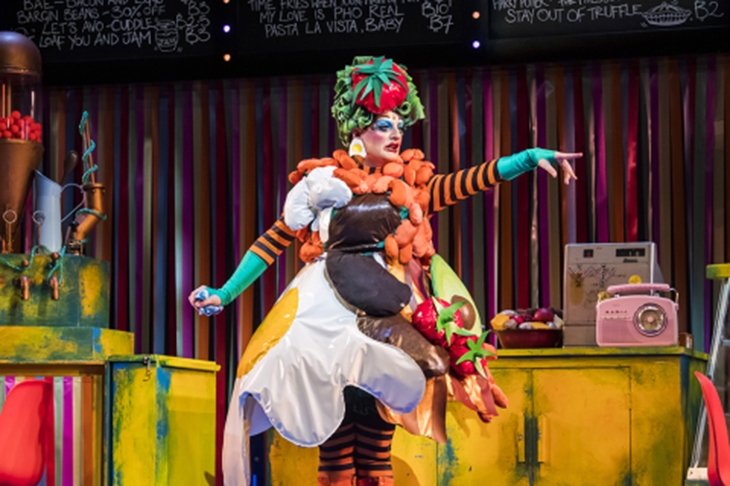The opening of Jonathan Maitland’s new play about Boris purports to be based on real events. Just before the referendum, the Tory maverick invited some chums over to help him decide whether to opt for Leave or Remain. Mrs Johnson was present along with Michael and Sarah Gove and the Evening Standard’s owner, Evgeny Lebedev. For a bit of fun, the writer adds spectral appearances from three ex-prime ministers, Blair, Thatcher and Churchill. This is amusing at first but it slows the play down because the fantasy figures can’t affect the real-life action.
There are dazzling performances here. Tim Wallers plays Evgeny as a name-dropping simpleton with naked ankles and an ultra-camp gait. Wonderful. Mrs Johnson (Davina Moon) is portrayed as a Farageist headbanger who thinks migrants cause crime. Will Barton gives an eerily accurate portrait of Boris without any of the harrumphing, finger-wagging, hair-tousling tactics usually deployed by his lookalikes. Dugald Bruce-Lockhart is a sensational actor but he’s unsuited to the role of the ironic, super-subtle, mischief-loving Michael Gove. He plays him as an earnest plodder. And the writer overindulges in Guardian-inspired untruths about Boris. We see him mocking Huw Edwards’s Welsh accent and then saying: ‘I apologise to everyone in Llanelli.’ But Boris is smarter and more courteous than that. The first act ends with a crass ‘power-for-power’s-sake’ speech that lacks any psychological accuracy. A dramatist should consider the possibility that Boris may want to lead because he loves the country and not just himself. If his patriotism is insincere, then he must secretly despise patriots whose feelings are genuine. And in that case, a hint of this malignity would have leaked out by now because Boris is notoriously careless of his public image.
The second act is a futuristic fantasy. It’s 2029 and a post-Brexit Britain, close to bankruptcy, seeks permission to re-enter the economic powerhouse of the EU. (Seriously, that’s the plot.) By this time, Boris has ditched his wife for an Asian babe flaunting a Belfast accent. Where did that come from? Everyone knows Boris’s new partner isn’t a Pakistani Ulsterwoman. The three ex-PMs pop up again for further jokes and speeches and the script evolves into a slice of pro-Remain propaganda dressed up as political satire. It’s a pity. The West End needs a Boris play but this one gets it only half-right. A wise impresario might intervene and ask Maitland to reshape the second act and add 25 gags to the whole script. Then he’d be in business.
Roughly once a year, I poke my head in at the Royal Court to see how the flop-factory is getting on. Swimmingly, it seems. White Pearl, by Thai-Australian ‘multidisciplinary artist’ Anchuli Felicia King, introduces us to a cosmetics firm in Singapore that sells skin bleach to Asian women. Their new advert features a white model in black-face who explodes after using their cream. A rough cut of the advert goes viral and a massive row about racism erupts at headquarters. Hotshot female executives strut around the office firing insults at each other while manoeuvring to avoid the blame.
All the characters are nasty, foul-mouthed dictators apart from two weeping dimwits who offer a bit of contrast. The story keeps contradicting itself. A rich bully named Built claims in scene four not to care about the viral clip. In scene seven she’s desperate to get it taken down even though it’s already been viewed 977,803 times. She seems not to know how the internet works. Yet she’s a digital marketeer. Or there’s her boss, Priya, a vitriolic monster who claims to be an anti-racist although she refers to her colleagues as ‘homeland Asian cunts’. Priya boasts that she entered the cosmetics trade because ‘all women hate themselves’. What a charmer. She’s convinced that she’s ‘smarter’ than everybody else because she studied ‘lateral thinking’ at a British university and yet she can’t distinguish North from South Korea, despite living in Singapore. Her surname, Singh, proclaims her Sikh heritage but she seems unaware that Sikhs are likelier to speak Punjabi than Hindi.
Many of the scenes take place in the lavatory. Here’s one. A female executive fellates a Frenchman whom she despises. When she accidentally learns that he’s broke, she offers him a bribe to say: ‘I’m a dirty whore.’ He repeats the desired words, takes the money, spits in her face and departs as she vomits into the loo bowl. Not the sweetest passage of action ever to be staged at the Royal Court.
This is a heartless, ill-plotted play by a writer who appears to loathe all the materials she has assembled: the characters, their jobs, their motives, their attitudes, and their use of language. Everything starts in the gutter and works downwards. The play ends on a question. ‘Why is that funny?’ It’s not. It’s tragic.







Comments